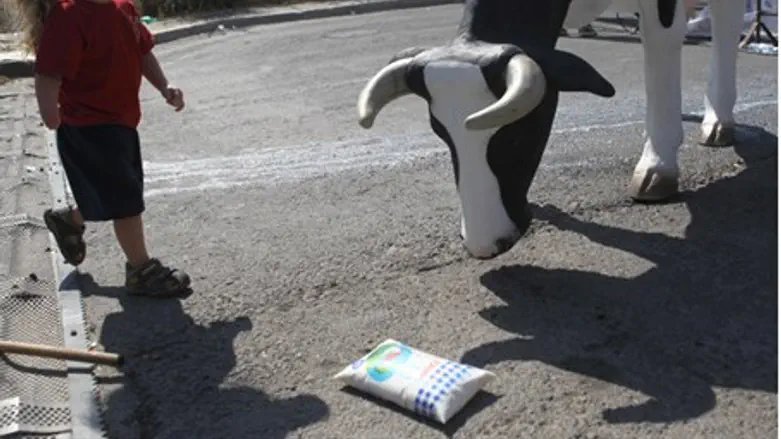
The Jewish holiday of Shavuot, which marks the Jewish People's receiving of the Torah at Mount Sinai, will begin at sundown on Saturday night.
On Shavuot, it is customary to eat dairy foods, one of the reasons being the saying that describes the Torah as having “milk and honey under its tongue.”
In advance of the holiday, the Israel Dairy Board published on Wednesday some data relating to the consumption of milk and dairy products in Israel.
According to the data, 1,338 million liters of cattle milk, 8.8 million liters of sheep milk and 11.4 million liters of goat's milk were produced in Israel in 2011. The consumption of locally produced dairy products in 2011 rose by 2.2%, while the population growth was estimated at 1.9%. That is, the consumption of dairy products per person increased by 0.4%.
The Israel Dairy Board's figures also found that cream cheese spread is the most popular cheese in Israel, and that 53,000 tons of it are consumed annually.
Dr. Samuel Friedman, professional director of the Israel Dairy Board, gave a special interview to Arutz Sheva in honor of Shavuot.
The Israel Dairy Board, explained Friedman, is a private company which includes public representatives, all of whom “sit together and take care of the entire policy regarding milk in Israel, milk production, quality and health.”
The dairy market needs planning because it is based on a quota system, he said.
“Every farmer has his quota and based on this quota he has to produce a certain amount of milk per year,” said Friedman. “We take care to ensure that the supply of the milk is provided, through this quota system, to all the consumers in Israel.”
He noted that most of the research out there points to the fact that milk is healthy.
“Most of the research says good things about milk and not bad things about milk,” said Friedman, noting that “we are proud of the fact that there has been an increased demand for sheep and goat milk this past year. We are trying to provide supply for all this demand.”
According to Friedman, the farmers are not to blame for the high prices of milk and dairy products, which in the past year have led to protests and boycotts by Israeli consumers.
“I don’t think the issue is with the farmers,” he said. “I think the issue is with the market. The government has to think about how to decrease the price of milk but not at the expense of the farmers.”